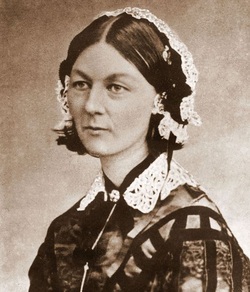
Nightingale came from a well-to-do British family and was able to travel widely. While in Egypt in 1850 she wrote of being “"called to God," and "...to do good." The opportunity to do good was soon to arise. After gaining basic medical training in Germany, she obtained a medical supervisory position and in 1854 she was sent, along with a staff of volunteer nurses she had trained, to Turkey to provide medical help to soldiers wounded in the Crimean War. It was at this time that her reputation was established; her nickname “The Lady with the Lamp” originated from a report about her work in the field hospitals published in The Times of London:
“She is a ‘ministering angel’ without any exaggeration in these hospitals, and … When all the medical officers have retired for the night and silence and darkness have settled down upon those miles of prostrate sick, she may be observed alone, with a little lamp in her hand, making her solitary rounds.”
Modern critics sometimes see Nightingale as a figure given hero status when heroes were needed for morale in a time of war, but her service in the Crimea is undeniable, and her further accomplishments for good are equally obvious. Florence Nightingale laid the foundations for modern professional nursing which led to her establishment, in 1860, of the first scientifically-based school of nursing – the Nightingale School of Nursing, at St. Thomas’ Hospital in London – which still functions as part of London’s King’s College. She was also involved in organizing training for nurses and midwives in workhouse infirmaries around England. A number of modern hospitals are named after her, and International Nurses Day is celebrated annually on May 12, in honor of her birthday.
Nightingale was raised in the Church of England and stayed within that denomination, but she had wide interests in religion and sometimes unorthodox views. She wrote a book on theology: Suggestions for Thought, which develops her ideas and in which she questioned the concept of a God who would condemn individuals who did not understand salvation; she felt that all would have the eventual opportunity of reconciliation. It is said that Nightingale comforted many of the sick and dying that she tended with her conviction of this. She was quoted as having said “… the real God is far more merciful than any human creature ever was or can ever imagine.”
Florence Nightingale died in 1910 at the age of 90 – after spending a great deal of her life in selfless service and helping others as a result of her personal calling. A woman of faith, she accomplished much through her concept of serving a caring and merciful God.
 RSS Feed
RSS Feed
